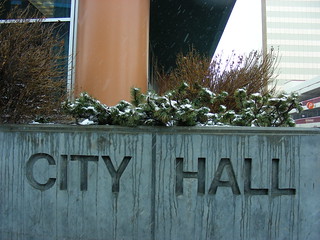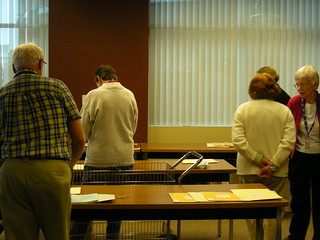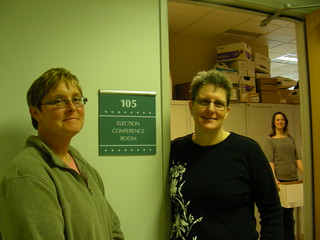Anchorage’s April 3 election: Some answers, many more questions
by Mel Green
Minnery given a pass; 6 times as many questioned ballots than in previous elections; a private company running election worker hiring and payroll; numerous “voters” from outside the Municipality; the Chapel by the Sea connection… here’s what we’ve learned in the past 6 days.
 Last Tuesday night, April 3, I was up all night through to the following morning writing a story about the Anchorage municipal election. That story was posted last Wednesday morning, April 4 at 5:22 AM, based in large part on Anchorage mainstream media coverage of the night and early morning hours of April 3 and 4. It described widespread ballot shortages at numerous polling places throughout the Municipality of Anchorage beginning around 6:00 PM — two hours before the polls closed. Thousands of questioned ballots were cast, some by voters who had been forced to stand in line waiting to vote, others by voters who might, according to Municipal Clerk Barbara Gruenstein, not even be qualified to vote in the election.
Last Tuesday night, April 3, I was up all night through to the following morning writing a story about the Anchorage municipal election. That story was posted last Wednesday morning, April 4 at 5:22 AM, based in large part on Anchorage mainstream media coverage of the night and early morning hours of April 3 and 4. It described widespread ballot shortages at numerous polling places throughout the Municipality of Anchorage beginning around 6:00 PM — two hours before the polls closed. Thousands of questioned ballots were cast, some by voters who had been forced to stand in line waiting to vote, others by voters who might, according to Municipal Clerk Barbara Gruenstein, not even be qualified to vote in the election.
Stories at that time attributed the ballot shortages and high number of questioned ballots primarily to misinformation promulgated in Facebook postings and an email message by Proposition 5 opponent Jim Minnery, in which Minnery told his followers that they could both register to vote, and also vote, on the same day. The email and one of the Facebook postings even told followers that they didn’t even need to do their “register-and-vote” in their own polling precincts.
Much has been learned since, some of which revises the story we had from election night.
Minnery’s incomplete confession
Information which came out later in the day on April 4 made it clear that Minnery’s misinformation was not enough BY ITSELF to cause ALL the ballot shortages and other problems of election day.
However, it still contributed to the problem.
Anchorage mainstream media continue to ignore Minnery’s February 17 email to members of his “Protect Your Rights: Vote NO on 5″ email list — included in our April 4 story — in which Minnery gave correct and complete information on the voter registration deadline for those who wished to vote in Anchorage’s April 3 election. As of this writing, I know of no Anchorage or Alaska mainstream media which have reported on the February 17 email, although some popular Alaska blogs have, notably The Mudflats in an story by Mudflats founder Jeanne Devon (writing as AKMuckraker) and on the blog What Do I Know? by former University of Alaska Anchorage professor Steve Aufrecht.
Perhaps emboldened by the pass he’d been given by Anchorage media so far, Minnery wrote an April 4 email with a section entitled “Humble Pie” in which he admitted to sending out misinformation about voter registration deadlines, but elaborated upon his election night story about having received the misinformation from an unnamed staffer in the Municipal Clerk’s office. Minnery’s “Humble Pie” claim was also posted by Minnery’s friend Dave Bronson on the “Protect Your Rights — Vote NO on 5” Facebook wall:
I encourage you to read Jim’s public confession and apology for putting out erroneous information on Tuesday. As you will see, there is more to the story. Thanks again for your support!! Dave Bronson
Humble Pie
When we make mistakes, I tell my kids, we own up. Time to swallow my own medicine. Yesterday morning, I received an inquiry from someone who wanted to know if it was possible to register to vote and then participate the same day in the municipal election. I wasn’t sure, so I phoned the City Clerk’s office and asked.
The employee I spoke with said it was allowed as long as they had lived in Anchorage for at least 30 days. I asked her again just to make sure. She repeated the same answer.
That’s when I sent out the e-mail that’s been paraded across the television, newspapers and blogoshere. I trusted what the Municipal staffer told me and passed it on to others through an Action Alert and on Facebook.
Turns out that was not good information. I then spoke personally with the City Clerk, Barbara Gruenstein, who told me people must have been registered 30 days before the Election to vote. When I shared with her that this was inconsistent with what one of her staffers had told me earlier in the day, she was silent. The bottom line is: I should have done more research before sending out the Action Alert. There is no good excuse other than I took the staffer at her word. I am willing to own up to my mistakes. Now is it possible that others might be willing to accept responsibility for theirs?
Those pushing Prop. 5 took my Action Alert, along with the fact that several polling stations had run out of ballots, and marinated them into a “scandal.” It’s hard to imagine, let alone implement, that kind of monumental scheme.
Minnery’s humble confession, however, failed to note his February 17 email or to explain why the complete, clear knowledge he had on February 17 somehow evaporated from his mind on the morning of election day.
“The bottom line is: I should have done more research before sending out the Action Alert,” he wrote.
The real bottom line is that he did do the research — way back in February — and later lied that he hadn’t done it.
Mainstream media gives Minnery a free pass
The mainstream media’s failure to report Minnery’s February 17 email wasn’t for lack of them being told about it. I posted my story including screenshots of the email at 5:22 AM on April 4, after staying up all night to write it. Before going to bed (I caught three hours before getting up again to work a half-day), I spent some time sending copies of the story to local and national LGBT media outlets. Local contacts I sent the story included people at KTVA Channel 11, KSKA (Anchorage public radio), the Anchorage Daily News, and Alaska Dispatch.
That night, after going to bed early, I woke in the middle of the night to use the bathroom. Before falling back asleep, I checked my newsfeeds, and found a lengthy story about the election at Alaska Dispatch. While a generally excellent, well-written story, it quoted Minnery’s “Humble Pie” email — but failed to make any mention of his February 17 email. Lying in bed with my iPhone at 1:24 AM on the morning of April 5, I sent the piece’s authors an email:
I woke up in the middle of the night and read your story which quotes from Minnery’s most recent email to his followers repeating his claim the he was misinformed by the municipal clerk’s office and saying he should have done “more research” himself on voter registration deadlines.
Whatever the truth may be about numbers of ballots, or anything else in this mess: here is at least one truth. On February 17, Minnery knew with complete clarity what the voter registration deadline was. Even if he refuses to take phone calls to have the question put to him, that fact should be presented to the public.
Later in the day, the Alaska Dispatch reposted the story (apparently after making some revisions). It still quoted from Minnery’s “Humble Pie” email, and still failed to make any mention of his February email. At 3:51 PM, I wrote again, this time including Alaska Dispatch editor Amanda Coyne on the recipient list:
It’s certainly disappointing that in the most recent article… you are continuing to give Jim Minnery a pass on his lie claiming he didn’t know what the voter registration deadline was for this election. As I wrote last night, he emailed to followers on his email list on February 17 the complete details of the deadline, other important election-related dates, and a link the the MOA page with voter registration information.
At about 5:00 PM that day, as I was leaving work, Amanda Coyne called me. She told me that newsroom staff at the Dispatch had been arguing about whether to report the February 17 email, since by that time it had been reported by the Municipal Clerk’s office that only 121 people had registered to vote on election day. (It was not known at that time if any of those 121 had attempted to vote.) She also characterized his “Humble Pie” explanation, in which he blamed an unnamed clerk’s office staff member for his misinformation, as “plausible.” She did eventually agree with me that Minnery should at least be asked for an explanation of the February 17, and said she was going to do so. Perhaps, in fact, she did — but if so, I’ve seen no report of it.
In the end, I was left feeling that Alaska Dispatch’s editorial stance was that if his election day misinformation did not by itself explain THE ENTIRETY of the election irregularities, it was not worth looking into it further. It hasn’t seem to have occurred to local media — not only the Alaska Dispatch (in particular, I also had middle-of-the night correspondence with David Hulen of the Anchorage Daily News) — that evidence is evidence, and that if Minnery did deliberately engage in misinforming people in an attempt to “crash the election,” that this “idiotic strategy” (as Minnery called it) might not only be the only strategy used toward that end.
[Correction: A reader pointed out a story that I had somehow missed, in which the Anchorage Daily News reported:
In February, Minnery sent out a different message, reminding people they needed to be registered by March 4 in order to vote, which was true.
h/t Jacob.]
Election Commission and Municipal Clerk’s updates
 The Municipality of Anchorage’s Election Commission has been sorting and reviewing questioned and unscanned ballots since Thursday, April 5. The Municipal Clerk’s office also began examining each precinct to determine which precincts ran short of ballots on April 3 and how shortages were handled. The clerk’s office has sent out a series of media advisories about the progress of their work.
The Municipality of Anchorage’s Election Commission has been sorting and reviewing questioned and unscanned ballots since Thursday, April 5. The Municipal Clerk’s office also began examining each precinct to determine which precincts ran short of ballots on April 3 and how shortages were handled. The clerk’s office has sent out a series of media advisories about the progress of their work.
- Media Advisory 1, April 4
- Media Advisory 2, April 4
- Media Advisory 3, April 5
- Media Advisory 4, April 6
The Election Commission worked on Saturday and will return to its work Monday, on which day another media advisory can probably be expected.
Election night ballot shortages
The Municipal Clerk’s office is required by Anchorage’s municipal code to print enough ballots for 70 percent of registered voters within each precinct in Anchorage (AMC 28.40.010 B). Because of the election night ballot shortages, it was initially assumed that voter turnout was unusually high — an assumption disproven by a close look at the numbers. As Steven Aufrecht, an emeritus professor of Public Administration at the University of Alaska Anchorage, wrote on the evening of April 4,
Normal turnouts for Municipal elections range from low 20% range to the mid 30% range. The numbers on the election results from last night show turnout at 26.82%….
What makes more sense, if lots of unregistered folks showed up, was that they ran out of questioned ballots. There were stories of people crossing out the Sample on the Sample ballots and using them. But there should still have been a lot of back up regular ballots.
Others assumed that either the clerk’s office failed to print enough ballots, or that a very large number of printed ballots went missing.
 In fact, according to Municipal Clerk Barbara Gruenstein, with whom I spoke on Saturday, there were no “missing ballots.” Rather, the required number of ballots were printed; precincts were supplied with the number of ballots it was believed would be needed, based on numbers from previous elections, with the remainder stored at City Hall to be ferried to precincts as needed. The problem, Gruenstein told me, was that the ballot shortages began to occur simultaneously at numerous locations, taxing the ability of the clerk’s office to resupply them.
In fact, according to Municipal Clerk Barbara Gruenstein, with whom I spoke on Saturday, there were no “missing ballots.” Rather, the required number of ballots were printed; precincts were supplied with the number of ballots it was believed would be needed, based on numbers from previous elections, with the remainder stored at City Hall to be ferried to precincts as needed. The problem, Gruenstein told me, was that the ballot shortages began to occur simultaneously at numerous locations, taxing the ability of the clerk’s office to resupply them.
Questioned ballots: Nearly 6 times as many as in other elections
 The latest media advisory from the Municipal Clerk’s office, Media Advisory 4, issued on April 6, stated that a total of 6,095 questioned ballots — nearly 6 times as many as in prior elections — had been cast in the April 3 election. 4,929 of the questioned ballots (80.9%) had been case before the ballot shortage arose. Deputy Municipal Clerk Jacqueline Duke, with whom I also spoke on Saturday, emphasized that in previous elections, there was an average of 8 questioned ballots per precinct. In this election, there was an average of 50 questioned ballots per precinct.
The latest media advisory from the Municipal Clerk’s office, Media Advisory 4, issued on April 6, stated that a total of 6,095 questioned ballots — nearly 6 times as many as in prior elections — had been cast in the April 3 election. 4,929 of the questioned ballots (80.9%) had been case before the ballot shortage arose. Deputy Municipal Clerk Jacqueline Duke, with whom I also spoke on Saturday, emphasized that in previous elections, there was an average of 8 questioned ballots per precinct. In this election, there was an average of 50 questioned ballots per precinct.
Clearly the high volume of questioned ballots contributed to the ballot shortages experienced in many precincts. Of the 121 precincts, 53 (43.8%) had ballot shortages on election night. 119 of the 121 precincts — all of them except for the two “absentee voting” precincts (UAA’s Student Union and the Anchorage airport) ran out of envelopes for questioned ballots.
High numbers of questioned ballots from people registered to vote in locations outside the Municipality of Anchorage
 Also on Saturday, Duke told me and two other observers that the day before, the first box of about questioned ballots that the Election Commission looked at, containing about 400 ballots, included 95 questioned ballots from people who were registered to vote in locales outside the Municipality of Anchorage, making them ineligible to vote in Anchorage. A quick look at other boxes (but not yet making an actual count, which would require also checking the voter rolls) gave her the impression that other boxes also contained about the same number of ballots from voters who were registered in locations other than the Municipality.
Also on Saturday, Duke told me and two other observers that the day before, the first box of about questioned ballots that the Election Commission looked at, containing about 400 ballots, included 95 questioned ballots from people who were registered to vote in locales outside the Municipality of Anchorage, making them ineligible to vote in Anchorage. A quick look at other boxes (but not yet making an actual count, which would require also checking the voter rolls) gave her the impression that other boxes also contained about the same number of ballots from voters who were registered in locations other than the Municipality.
If those numbers hold, that would be nearly one-quarter (~25%) of questioned ballots being cast by people who were registered to vote in places other than the Municipality of Anchorage. Both Gruenstein and Duke told me that the final report on the election would delineate the total number of questioned ballots which originated with non-Municipality attempted voters (as well as delineating other reasons for which questioned ballots might be rejected, for example, people who were not registered to vote at all, or people who were ineligible to vote because of felony records, etc.).
Alaska ACLU calls for special counsel
On April 5, Jeffrey Mittman, executive director of ACLU of Alaska, called upon the Anchorage Assembly to appoint an independent special counsel to investigate the April 3 election. This followed on reports that the election was being investigated by Municipal Attorney Dennis Wheeler. Wheeler and Assembly chair Debbie Ossiander rejected the call for an special counsel as “premature.”
Mittman and the Alaska ACLU, of course, have their own interests in the outcome of the election: Mittman is a member of the Campaign Leadership Team of One Anchorage, the organization which brought Proposition 5, the Anchorage Equal Rights Initiative, to the ballot; and the ACLU of Alaska contributed $10,000 to the One Anchorage campaign (as of Alaska Public Office’s Commission (APOC) reports about one week before the election). However, Mittman’s call was not for the ACLU to play a role in either the investigation itself, or in choosing the special counsel he called for in his legally detailed letter. Municipal Attorney Dennis Wheeler, on the other hand, serves at the pleasure of Mayor Dan Sullivan, who was a candidate in the April 3 election. He is already investigating the election from a position which creates a conflict of interest.
(Sullivan, first elected mayor in 2009, appears to have won reelection, according to votes tallied so far.)
ESS Labor Services
In its Media Advisory 4, the Municipal Clerk’s office revealed that for this election, the Municipality had contracted with a private company, ESS Labor Services, to provide employment and payroll services for 550 to 600 temporary election workers.
Following a competitive bid process, the Municipality entered into a Professional Services Contract with ESS Labor Services to provide employment and payroll services for 550 – 600 temporary election workers. The MOA provided ESS with a historical database of temporary election workers to be used as a pool of candidates for recruitment. The compensation of election workers is set by State statute – the guidelines for compensation for election workers was not changed. Employment specification and duties of the election workers also remained the same from 2011.
The decision to move to an independent contractor was based on management of resources. Prior to this contract, an election worker was hired as a municipal employee. All the hiring documentation, employment applications, verification, employee classification, payroll, filing, tax reporting, tax withholding, and then termination (the reverse of all of the hiring paperwork) required for a municipal employee also applied to these 600 temporary employees.
According to a contact of mine in the oil services industry, ESS is the company which took over the field service hospitality contracts that had belonged to VECO Corporation before VECO came apart in the wake of the 2007 corruption convictions of VECO CEO Bill Allen and vice president Rick Smith.
In a news report largely devoted to the high number of questioned ballots, the Anchorage Daily News also reported:
One other election surprise:
This year the city contracted with a private Anchorage company called ESS Services to run payroll and employment services for the same group of municipal election workers that have served in the past. They said the decision was based on “management of resources.”
The overtime threshold for a government agency is 40 hours per week. But for a private employer it is eight hours a day.
Lots of election workers worked more than eight hours in a day this week, Gruenstein said. That could mean the city could be paying for lots of extra overtime this year.
“Last year we spent $136,000 on election payroll,” Gruenstein said.
She estimated that could increase by at least $34,000 this year.
For some reason, those paragraphs were later removed from the version of the story appearing at the ADN website; they can still be seen in a Google-cached version of the story.
The cost of election workers’ overtime with the private contractors leads to some ironic questions about the budget economizing that Mayor Dan Sullivan like to be known for. Other questions: How were determinations about “management of resources” necessitating the use of a private contractor made, and who made those decisions? Did ESS’s involvement have any effect on the lines of supervision and instruction of election workers? How was the infrastructure of running the election affected, if at all?
The Chapel by the Sea connection
Since Friday, Bent Alaska has learned that Mona McAleese, Labor Services Manager for ESS Labor Services (per her Linked-In profile), is a long-time member of Chapel by the Sea, according to a testimony from McAleese from February 15, 2009 on Chapel by the Sea’s website.
McAleese’s affiliation with both ESS and Chapel by the Sea may be completely unrelated to the problems of this election; but the connection is nonetheless worth taking note of: Chapel by the Sea was of the top three contributors to Jim Minnery’s anti-Prop 5 “Protect Your Rights” group. Chapel by the Sea has also figured in election night accounts:
Dianne Holmes said she was shocked to see a uniformed security guard at an entrance to Chapel by the Sea, a south-side church that is also a polling site.
One voter, she said, asked her why the security guard was there.
“She felt intimidated,” Holmes said.
Pastor Tim Davis said his church became the target of harassing phone calls and messages after the church gave thousands of dollars to the campaign opposing Proposition 5 was mentioned in TV ads.
A worried church elder privately hired a security guard to “drive through the parking lot” on Election Day in case any animus lingered, Davis said, to make sure things were “calm and serene.”
He said he was not sure why the security guards ended up inside the building.
Another voter commented at an Alaska Dispatch story that dispelled rumors that gays would riot if Prop 5 failed:
by kraall | April 3, 2012 – 5:54pm
Security guard at my precinct at Chapel by the Sea this morning. Very chatty and friendly. Seemed odd to have him there, but equally odd to have polling taking place on the church grounds; Chapel by the Sea is one of anti-Prop. 5’s biggest contributors. It’s been an official polling place for years, but still felt odd.
And the Anchorage Daily News political gossip column Alaska Ear also reported yesterday on the matter:
RIGHT GUARD . . . Did we ever figure out who paid for the uniformed security guard standing in the narrow hallway to the voting room at Chapel by the Sea? Earwigs report various answers to informal queries, i.e. a parishioner worried about “threats,” the city, etc. An earwig who called the city to complain that such a presence might intimidate some potential voters was assured the elections office knew nothing about it — so no problem.
Speculations
There has been plenty of speculation about the cause of the April 3 election irregularites — particularly after Minnery’s election day misinformation came to light. Steve Aufrecht, writing on April 4:
As soon as I heard that there was a rush of people to the polls and they ran out of ballots, I began to suspect that this was an intentional attempt disrupt the elections.
[Bent Alaska’s April 4 story] makes it clear that the “Protect Your Rights” folks knew full well that the information was false. They’d sent an earlier email out to their list telling people exactly when the registration deadline was. Is it possible the person who did the FB page and the email acted alone and didn’t know about the deadline? Not likely….
Let’s go back to 2009 when the Anchorage Municipal Assembly had hearings on an ordinance that would have done the same thing this ballot initiative tried to do…. There were enough votes to pass the ordinance on the Assembly, but Minnery and his Anchorage Baptist Church friends flooded the Assembly with people to speak against the ordinance – including busing people from outside of Anchorage….
It’s clear, to me anyway, that Minnery’s group’s Facebook post and emails were intended to get unregistered voters to the polling places to ask to register and then vote, which Minnery knew they were not entitled to do. He couldn’t help but know that this would disrupt the election process by diverting the attention of the voting officials from helping qualified voters. And that it would increase the number of challenged vote ballots needed way beyond the normal level.
But, as we now know, while Minnery’s misinformation very probably drove at least some of the 121 persons who registered to vote to the polls that day (again, whether or not they actually attempted to vote is not yet known), that ploy could not account for the entirety of the high levels of questioned ballots cast that day — again, nearly six times the levels of any other Anchorage election.
But Steve’s account of 2009 AO-64 fight points to another thought. Is it possible that the strategy which worked so well to scotch the Anchorage equal rights ordinance in 2009, was adapted to also scotch the Anchorage Equal Rights Initiative — Prop 5 — in 2012? Is it possible that Minnery and the Anchorage Baptist Temple’s Jerry Prevo, again, bused in people from the outside the Municipality?
In any case, one theory that could fit the facts we have so far might posit an organized effort to bum-rush the precincts with the high levels of questioned ballots, leading to ballot shortages. It was simply a matter of exploiting a weakness in the standard election procedures about how the number of ballots distributed to the various precincts — a weakness that the Municipal Clerk’s office had never figured for a weakness, because it had never before been challenged by so many people casting questioned ballots. If someone planned such a bum-rush to take place at multiple precincts — say, about 43 percent of them — simultaneously, during the after-work rush to the polls, a bottleneck would be created: the clerk’s office would have to contend both with too few staff and with high city traffic to resupply all the affected precincts — all that on top of the confusion and overwhelm that workers at the precincts would be feeling with the unanticipated problems. All such a plan would require would be someone with the inside knowledge of how ballots were distributed to the precincts, in order to know how best to bum-rush them.
Is that what happened?
Whatever the real truth is: we need an investigation to determine it. It’s also clear that the a revision of standard election procedures is in order, to prevent such problems that once were unanticipated — but are so no longer.
The Clerk’s Office reminds people who attempted to vote, but were unable to because of a shortage of ballots, that they may contact the Clerk’s Office. Please email the Clerk’s Office at election2012@muni.org. When doing so, please include your full name and the number, name or location of the precinct(s) involved. If you are willing to be contacted by phone, please also include your phone number. The Clerk’s Office will collect and catalogue the information so that the Municipality can take this information into consideration, but will not be able to personally respond due to the present heavy workload.
Note: Normally I include a full list of references, but I don’t have time right now. I’ll add ’em later!
h/t “Nancy Drew”
Photo credits: All photos by Melissa S. Green.
Related posts:
- Anchorage election update, 10 April 2012
- Anchorage Assembly work session on April 3 election irregularities: The livetweets
- Anchorage Election Commission special meeting of April 21: Holding Duke accountable on “ignore broken security seals” instruction
- Anchorage election update, 11 April 2012: Anchorage Assembly meeting
- No Questions, Questions


!["The Other Side of Tolerance (It's Very Simple - If You're Not Registerd [sic], You Don't Vote." "The Other Side of Tolerance (It's Very Simple - If You're Not Registerd [sic], You Don't Vote."](http://www.bentalaska.com/wp-content/uploads/2012/04/2012-02-17.minnery.register.jpg)

















